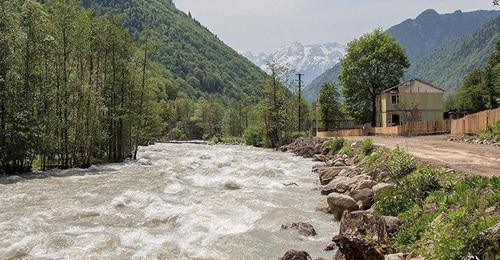Chuberi residents cut off from world by flooding
The Nenskra River, which came out of its banks, swept off the bridges to the village of Chuberi in Georgia. Some of the houses in the village have been flooded, reported Nino Vibliani, the spokesperson for the Mestia district municipality. Residents of Chuberi believe the flooding was caused by a mountain collapse and construction of a hydroelectric power plant (HPP).
On July 4, 2016, residents of the Chuberi village held an action to protest against the construction of the HPP. According to the protestors, the HPP is being constructed in a seismically active zone, where landslide processes take place, and thus it poses a threat to the local population.
Today, the Nenskra River, which has left its banks, has flooded the central road and destroyed the bridges, local residents informed the "Rustavi-2" TV Channel, which report was watched by the "Caucasian Knot" correspondent.
"No one remembers a situation like that. The central bridge has completely gone over the water," said one of the residents of the Chuberi village.
The villager has associated the incident with the construction of the Nenskra HPP.
According to the local residents, a part of the mountain near the Chuberi village has collapsed. "The upper part of the Chuberi village is actually separated from the external world, since the bridge no longer exists," said one of the local residents.
"All the bridges that led to our village are destroyed by the disaster. We are cut off from the electricity supply. It is possible that soon we will not be able to communicate with the world. We are cut off from the world and we do not leave our houses. And some houses have been flooded," reported in the Chuberi village Nino Vibliani, the spokesperson for the Mestia district municipality, as quoted by the "Sputnik-Georgia".
This article was originally published on the Russian page of 24/7 Internet agency ‘Caucasian Knot’ on July 5, 2018 at 07:25 pm MSK. To access the full text of the article, click here.
Source: CK correspondent






![Tumso Abdurakhmanov. Screenshot from video posted by Abu-Saddam Shishani [LIVE] http://www.youtube.com/watch?v=mIR3s7AB0Uw Tumso Abdurakhmanov. Screenshot from video posted by Abu-Saddam Shishani [LIVE] http://www.youtube.com/watch?v=mIR3s7AB0Uw](/system/uploads/article_image/image/0001/18460/main_image_Tumso.jpg)